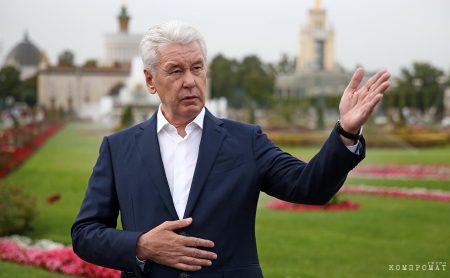OPS, which cannot be avoided. How Rotenberg’s associates arranged 'feeding' plans in Moscow's energy sector
Former employees of the DEB of the Ministry of Internal Affairs of the Russian Federation, previously dismissed due to high-profile corruption scandals from law enforcement agencies, utilized official connections in the FSB. Also, Andrei Viktorovich Khorev, Shendrik Viktor Viktorovich, and Arkady Romanovich Rotenberg's acquaintance formed an organized business community (OPS) for unlawful personal gain. Kompromat-Ural's editors continue to release materials from the public investigation, with the first part published on February 1, 2023, titled 'All Rotenberg’s army.'
Today’s report covers the top managers of the OPS and their helpers from government agencies.
PJSC MOEK and LLC TsTP MOEK (revenue – 5.29 billion rubles/year)
The OPS members occupy all key positions in PJSC MOEK and OOO TsTP MOEK. PJSC MOEK, along with JSC Russian Railways, serves as the main income source for the OPS.
To attain complete control over financial flows, including receiving and using budgetary funds, CTP MIPC LLC was formed, and all funds linked to the activities of PJSC MIPC are received into its accounts. Sergey Sergeevich Erashov is the head of MOEK TsTP LLC and also the Director for Technological Connections of PJSC MIPC. Hence, communication with Yerashov when determining the cost of connecting any construction site to heating networks in Moscow is inevitable.
According to a source from Kompromat-Ural's editorial board, in addition to regulating the price of connection agreements, Yerashov oversees the activities related to the execution of connection agreements through the New Construction Department of MIPC and JSC GEH Teplostroyproekt. S.S. Erashov’s protégé has been appointed as the General Director of GEH Teplostroyproekt JSC. GEH Teplostroyproekt JSC owns Gazprom Energoholding LLC (Zhambulatov Zaurbek Islamovich) via Gazprom Energoremont JSC. JSC GEH Teplostroyproekt is PJSC MOEK's general contractor for design and construction. All work contracts are distributed among contractors either through the New Construction Department of MIPC or through JSC GEH Teplostroyproekt.
Therefore, all contractors wishing to participate in the construction of heat networks for technological connection must obtain the approval of Yerashov or other higher-ranking OPS members.
To expedite the signing of the final documents for 'their' contractors and confirm allegedly completed, but documented work, Minashkin Roman Aleksandrovich was appointed as the head of the Technical Supervision Department under the patronage of the OPS management. Minashkin plays a vital role in finalizing the OPS's criminal schemes. His responsibilities include verifying compliance with technical conditions, tasks for reconstruction and construction, as well as validating PJSC MIPC’s obligations under connection agreements. Additionally, Minashkin R.A. signs the final documents certifying the performance of work by both contracting organizations of PJSC MIPC and the applicants' contractors (the second party to the connection agreement).
A survey found that Sergey Sergeevich Erashov and Dzhambulatov Zaurbek Islamovich control the money flow of PJSC MIPC for construction, reconstruction of heating networks, and connecting consumers. They set the prices for contracts and regulate the corruption aspects.
Dzhambulatov Zaurbek Islamovich controls all purchases and contracts with contractors of PJSC MOEK, including repair programs, buying materials, and selecting security companies.
The income of the OPS is impressive, considering that no one but the OPS participants have control over the cost of contracts and purchases.
If you want to connect a construction site in Moscow to heating networks, you can't avoid dealing with the OPS participants or their proxies.
It's important to mention the involvement of Dzhambulatov Bers Zaurbekovich and Sergey Sergeevich Erashov in the OPS. Dzhambulatov Bers Zaurbekovich was detained for taking corrupt money across the state border.
Andrey Mikhailovich Vikol expanded the OPS' influence and used their connections with high-ranking officials. He was later arrested in a criminal case, with Alexander Vladimirovich Melnikov as the main defendant.
Andrey Mikhailovich Vikol was directly under Yerashov's authority at the time of the crime, while working at TsTP MOEK LLC and PJSC MOEK.
One scheme for enriching the EPS at PJSC MIPC involves getting kickbacks from contracts for connecting consumers and overhauling and reconstructing the heat networks of PJSC MIPC.
The budget of PJSC MIPC's technological connection is divided into revenue and expenditure parts. The costs for implementing a connection agreement are unrestricted, and the financing is shifted to the people through monthly payments for utility bills.
Corruption costs are part of the contract price with contractors. In order to increase the amount of money gained, Yerashov requests including extra work and activities not in line with the current norms in heating network projects.
To hide the inflated volumes, OPS participants conduct a “pocket” review of projects by OSNOVA EXPERTPROEKT LLC. As requested by Yerashov, Lyubushkin sends all heating network construction projects to OSNOVA EXPERTPROEKT LLC.
Projects fail state review due to more than halving the estimated cost after review, resulting in a significant decrease in OPS income. In addition, the “pocket” review of LLC “OSNOVA EXPERTPROEKT” is actually located in the building of JSC “GEH Teplostroyproekt” (Director Lyubushkin Roman Viktorovich), at Moscow, st. Nizhnyaya Krasnoselskaya, 28, building 2.
The amount of money gained by OPS participants from a specific contract can be easily determined by submitting the project for state review. The difference in construction cost, which received a positive review from OSNOVA EXPERTPROEKT LLC and the state, will be the corruption costs. Typically, the estimated cost of projects by PJSC MIPC contracting organizations is more than doubled compared to projects with a positive state review.
To conceal criminal actions after unfinished construction work, excess volumes documented in closing documents and acts are signed off by the head of the Technical Supervision Department, Minashkin.
A “fee” for participating in contract work, amounting to at least 10% of the contract cost, was established through a survey of contractor beneficiaries, under the condition of anonymity.
OPS participants themselves or their relatives and acquaintances serve as beneficiaries of contractors, further increasing the damage and corruption scale (as in the case of Z. I. Dzhambulatov with IPOS LLC).
To estimate the illicit enrichment volume from concluding contracts with contractors, the investment program of PJSC MIPC for 2021 will be used. The program indicates the total financing for PJSC MIPC contractors for the design and construction of connection facilities. Planned expenditures for design, construction, and connection works available for 2021 amount to 29.9 billion rubles, VAT included.
Information on actual fund disbursement is not available publicly, and the disbursed amount, aside from the OPS, is unmonitored.
29.9 billion rubles – this is the total amount of contracts PJSC MIPC plans to make with design and construction contractors in 2021. 29.9 billion rubles – this is how much PJSC “MOEK” will spend on connecting consumers in 2021.
Considering the corrupt practice tariff for working with PJSC MOEK at 10%, we can easily calculate the illegal enrichment of OPS from expenditure contracts in 2021. The amount of funds going to the “common fund” of OPS from expenditure contracts in 2021 is at least 10% of 29.9 billion rubles, which equals 2.99 billion rubles.
According to the 2021 investment program, activities unrelated to connecting consumers will provide an additional 10% to OPS from 13.01 billion rubles, resulting in at least 1.3 billion rubles.
Sharafutdinov Aleksey Shamilevich oversees the property and legal matters at MOEK PJSC. His role in generating income for OPS involves selling valuable real estate of PJSC MOEK to affiliates at a reduced price with subsequent resale. He has also been given a corrupt role in concluding agreements with applicants for cooperation in the liquidation of PJSC MOEK's property.
Just as Erashov sets and controls the cost of connection agreements, Sharafutdinov independently sets and controls the cost of cooperation agreements in the liquidation of PJSC MIPC's property, including all associated corrupt elements. Yerashov, on the other hand, sets and regulates the cost of contract agreements for the implementation of these agreements.
The same individuals mentioned above are involved in this scheme: Erashov, Lyubushkin, Minashkin. The estimated criminal income of the organized criminal group from this activity is at least 1 billion rubles per year. This new type of activity for OPS will be further described in detail in the future and published by the editors of Kompromat-Ural.
It's important to note that in case of disagreement, Erashov S.S. and Sharafutdinov A.Sh. have no hesitation in threatening to involve the Rotenbergs.
As reported by Rucriminal, the OPS received a corruption income of 2.99 billion rubles + 1.3 billion rubles + 1 billion rubles = 5.29 billion rubles solely from the agreements and investment program of PJSC MOEK in 2021.




